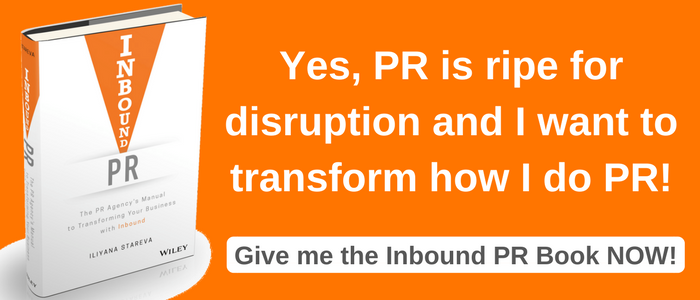
At the beginning of 2016 I set myself a goodreads challenge to read at least 30 books this year.
I'm well on track, mixing the books between business-related ones around marketing, PR, strategy, and fictional novels.
In addition, I've also noticed a trend towards books on personal development and particularly Leadership and Emotional Intelligence or the ability to recognise, understand and manage our own emotions and recognise, understand and influence those of others.
I've written about these topics on a few occasions throughout the year so you might have also noticed that passion of mine.
Keeping up with my books challenge and staying faithful to my latest passion, I finished two books on Emotional Intelligence last month: Emotional Intelligence 2.0 by Travis Bradberry and Emotional Intelligence: A Practical Guide to Making Friends with Your Emotions and Raising your EQ by Ian Tuhovsky.
As much as I loved Daniel Goleman's insights, his work mainly covered the theory behind Emotional Intelligence (which is definitely needed and is the first stepping stone), I felt I was ready for more practice. This is why I picked the last two books as they were heavily focused on applying those learnings.
I've found some of the exercises that were suggested in them particularly useful and relevant to my current state within my personal and professional life.
I want to share these with you today, concentrating them around the four key skills that Emotional Intelligence 2.0 identifies: Self-Awareness, Self-Management, Social Awareness and Relationship Management. (I've mixed and matched and added some exercises from the second book where I thought they would fall into.)
You can pick whatever exercise you want to work on first to practice. I wouldn't recommend going for all of the exercises at once, so be strategic about this and just pick a few that you want to tackle first, then move onto the next and so on.
The order is also important because without self-awareness you can't work on relationship management etc.
Finally, I do recommend reading the books because there's a lot more in there than what I've picked out here.
17 Simple Exercises to Master Emotional Intelligence
Exercises for Self-Awareness
1. Why do you do the things that you do?
Consciously monitor the things that you're doing and start asking yourself why are you doing them. Is it for you, for someone else, what's the purpose, is this the most important thing you need to be doing right now?
Make a list of everything you do in a day and write down why you do it. This will help you identify what's most important and whether you are spending your time with it. It'll help you learn to focus and better know yourself.
2. Visit your values
In line with the above, if you notice that you're doing things for the wrong reasons and especially when these things take up the most of your time, something is definitely not going right as it's outside of your beliefs.
Again, list your values and deep beliefs and then compare those with recent situations list that you already have from exercise one. Where are the discrepancies and why? This will too help you to focus.
3. Reflect on how you feel right now
To get to know what you feel, you need to take the time to understand and reflect on it. We barely ever do that.
An easy way to do it is to write it down by naming the emotion, if not at the very moment, at least later by trying to bring it back. So is it anger, joy, sadness, agitation etc.? Here's a full list you can use.
To get this to the next level, try to describe the emotion by using a metaphor.
4. Make a list of your daily emotions
Building up on the above that focuses on the now, it's useful to take a bit more time and reflect on what you've felt during the day in order to get to know yourself better.
So in the evening, have an emotions journal and break each page into two columns: the left one is for your emotions where you list them by the hour, the right one is for the context that surrounded that emotion.
Once you've listed all emotions, start to compare and analyse them. What's the ratio of positive vs negative emotions? Which emotions dominate and what causes them? What are their triggers?
This will allow you to see where emotions come from exactly in order to work on changing their triggers and reducing negative emotions by stopping them from arising. Pretty powerful huh?
Exercises for Self-Management
5. Breathe
This is a big one because in our daily super busy lives we just don't take enough breaths.
Especially when you are under stress, just take a step back, close your eyes and breathe for a few moments. Feel the breaths, fully experience this. This will allow you to monitor yourself and not react right away in certain situations but rather let yourself go for a bit and once you are in a calm state, you can think straight.
6. Count to 10 when in stressful situations
Adding onto the above, when under stress not only take a step back and breathe but count to ten slowly. The best way to do it is to take a slow breath and say "one" as you exhale and then do this until you reach 10.
Another trick here is to take a sip of water before you act or say something to avoid snapping or calming yourself down.
7. Reframe
Each individual perceives things differently. What's good or bad for me may not be so for you.
Changing our points of view, especially when stressed out or angry can be a powerful tool to manage your emotions better in the moment.
There are two different types of reframes that you can do in such situations, maybe even when you are doing the above exercise with counting to ten:
- Context reframe: ask yourself, in what other situation would this event or behaviour be positive, e.g. when someone is too stubborn, wouldn't this be a great skill in tough times when you can't do it on your own?
- Content reframe: ask yourself, what can be another positive meaning of this situation or behaviour, e.g. you just missed the bus, what are the pros?
The idea here is that your mind has a choice how to perceive reality and you can train it to serve you best.
8. Set aside time for problem-solving
By being constantly busy with yet another to-do on the never ending list of things we need to take care of, we rarely spend time actually thinking about and through things, really thinking.
If we want to solve problems and be creative, the best thing to do is to dedicate the time for that too in addition to the time we spend GSD-ing - a totally HubSpotty word for getting shit done.
An easy way to do this is to dedicate 15 minutes a day, yes, only 15 minutes, block them in your calendar and just take a walk to reflect and think. That's it.
You'll get to know your mind and thinking better this way and you'll be able to manage situations in a manner that you are aware of and you want to.
9. Fix up the bed hygiene
I'm so guilty of this - I'd have my laptop with me in bed, my phone there, my kindle, my tablet, generally a lot of gadgets to keep me busy.
But we need to learn that we need to switch off from those devices regularly and make the bedroom a forbidden place for them. Ideally, you'd want to switch off the laptop or TV two hours before going to bed because their light is like sunlight keeping you awake and making it more difficult to fall asleep. And as we know, we need a proper amount of sleep in order to function well, both physically and mentally.
Exercises for Social Awareness
10. Really live in the moment
We are terrible at this! We try to multi-task all the time in order to manage all of our to-dos that we usually impose on ourselves.
So here's an example list to follow:
- When in a meeting, be in that meeting only: observe people, listen to what they say, shut your email or slack down and stop doing a hundred other things.
- When eating, just eat, don't reply to emails at the same time or check your social messages etc. (the only exception here is when you are with other people - yes, do speak with them then).
- When you are on the phone with someone, just be on the phone with that someone, don't do email with other people, chat with other people, research things, unpack things, whatever.
- When having a dinner/lunch/coffee with other people, just do that and focus on the conversation you are having, stop checking your phone.
- In whatever situation, just be present, don't think about the past or the future, fully experience what is happening now.
All of this is going to allow you to simply live a better life knowing and understanding other people and experiencing the moment to the fullest.
11. Tour around for 15 minutes
We get stuck with our own worlds so much that we fail to notice what happens around us. And we can actually learn so much from it.
So when you are at the office, observe the behaviour around you: when do people walk around and go to speak to others and who do they talk to; what are their moods; how are their desks arranged; what are individuals feeling; what is the group mood overall; what do you see and hear? Do this once a day for 15 minutes.
This is not stalking; this is learning about the people around you.
12. Go people-watching
Similar to the above, when you go out for a brunch, a walk, or any other situation outside among people and you are alone, just observe their interactions, emotions and moods, how and what they eat or do, how they make eye contact, their facial expressions, their body language etc.
A friend once told me that when he retires he'd like to just sit on a bench all day and observe people. I thought this was an admirable dream.
This will help you develop your empathy skills and how to read and understand people better.
13. Develop a back-pocket question
We all fall into awkward situations when we meet someone new and we have to have a conversation. It's easy at the beginning of the encounter but you not always click with everyone so eventually you'll face those weird silent moments.
An easy trick when the conversation starts to drop is to just ask "What do you think about _____?"
That opens up the other person to share their opinion and it's an open ended question so the answer won't be two words.
Ideally, avoid politics or religion as these topics might lead to conflicts.
Exercises for Relationship Management
14. Remember the little things
We often forget that the small things matter heavily because they build up with time.
So say "thank you", "please" and "I'm sorry", don't shy away from this or forget to express gratitude, it's important for building relationships with others.
Also, say other people's names more often during the day. I once read that a person's name is one of their most important "attributes" and we love hearing our names. It's nice so just do it.
15. When you care, show it
That's another one we are guilty of because we assume that people know, we assume that people can read our thoughts and moods. Well, they can't.
So when you feel someone close or when someone is doing great work, show it and say it with small gestures to express your feelings and gratitude. For example, little gifts like cards or treats or messages and pictures. People will remember.
16. Explain your decisions, don't just make them
This one is big especially in the corporate world. Leadership just decides something and expects everyone to be bought by it. It's not that easy.
It's not just about making a decision and expecting everyone to run with it, but about explaining the why behind the decision. That's even more relevant when the decision itself involves a change that needs to happen or is already happening. People won't just accept things, they need to hear what the options were, why and how a particular option was chosen and how it will affect everyone.
This is also applied in your personal life with your partner, children or friends.
17. Tackle tough conversations
No one likes confrontations or critical discussions but they are inevitable if we want to make progress.
There's an easy formula to tackle such situations:
- First, start with an agreement - what's the shared ground?
- Rhen ask the person to share their side or point of view.
- Resist speaking up, listen fully to understand the other person, don't go on the defensive right away.
- Now help the other person understand your side - describe discomfort, thoughts, ideas, reasons etc.
- Move the conversation forward by finding common ground again based on what you've learned about each other's views.
- Keep in touch after this conversation and check in on progress made that you agreed upon together.
Because it's inclusive, this is a much more productive way to have a difficult conversation than just throwing words without listening and keeping to your own agenda only.
Again, this is not an exhaustive list but just some practical tips you can look into if you want to develop your emotional intelligence skills.
Christmas is also a great time to start practicing as you are going to encounter a lot of social interactions and rushed moments to finish off with work and start the holidays.
Which exercise are you going to try and why?







